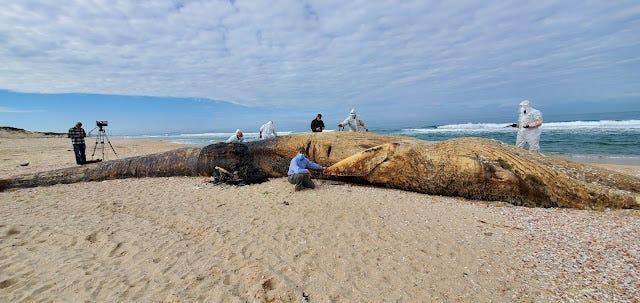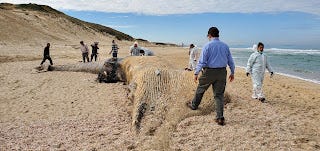Encountering Leviathan
This morning, I had a truly once-in-a-lifetime experience. It was reported that a young whale had washed up dead on a beach - an extremely rare event in Israel. I couldn't possibly miss the opportunity to see it, so off I went!

The whale was a fin whale, also known as a finback whale. This is the second-largest species of whale in the world, after the blue whale. Fin whales can reach ninety feet (27 meters) in length, and weigh up to around 110 tons. This one was a juvenile, at around fifty feet (17 meters) long and an estimated weight of only 25 tons. The cause of its death was unclear, but there has recently been terrible pollution off the coast of Israel, with a tar spill that has killed turtles and countless other wildlife. It was very sad that such a magnificent creature should have died at a young age.

I had hoped to be able to cut out one of its baleen plates, to complement the various whale parts that are on exhibit at the Biblical Museum of Natural History. Alas, the saw that I brought for the task just wasn't up to the job. The scientists there were also struggling with their tools as they tried to cut open the enormous carcass. Eventually they brought a generator and power tools, with which they were able to make progress, but by that point the stench was so overwhelming that I just couldn't bear to stay any longer. But I did manage to film some videos, which we will be editing and posting. (In the interim, we have a brief video clip on the museum's Facebook page.)
Whales are, of course, mentioned in Tanach. Barchi Nafshi, my favorite chapter of Tehillim, is a paean to the great wonder of the natural world, including animals such as hyraxes, ibex and storks. It includes the following account of the ocean:
מָה רַבּוּ מַעֲשֶׂיךָ יְהוָה כֻּלָּם בְּחָכְמָה עָשִׂיתָ מָלְאָה הָאָרֶץ קִנְיָנֶךָ: זֶה הַיָּם גָּדוֹל וּרְחַב יָדָיִם שָׁם רֶמֶשׂ וְאֵין מִסְפָּר חַיּוֹת קְטַנּוֹת עִם גְּדֹלוֹת: שָׁם אֳנִיּוֹת יְהַלֵּכוּן לִוְיָתָן זֶה יָצַרְתָּ לְשַׂחֶק בּוֹ: (תהילים קד:כד-כו)
“How manifold are Your works, O God! In wisdom You have made them all; the earth is full of Your creations. Here is this great and wide sea, where there are innumerable creeping things, creatures small with great. There go the ships; and Leviathan which You have made to play in it.” (Psalms 104:24-26)

I photographed this humpback whale in Alaska
As I explained in a post a few years ago, there is actually some ambiguity regarding the meaning of this verse. The Hebrew phrase לְשַׂחֶק בּוֹ “to play in it,” can be translated in different ways. Who exactly is doing the playing? And what is Leviathan, anyway?
Simply speaking, the verse is referring refers to God having Leviathan to play in the sea. This is indeed how most of the commentaries explain it. And while Midrashic accounts of a titanic leviathan have been interpreted by some as referring to an actual creature of stupendous proportions, and by others as an allegorical concept (and this is one of the topics of the Maimonidean controversies, discussed in my book Sacred Monsters), the leviathan of Psalms can straightforwardly be explained as the whale.
Rashi, however, following an Aggadic portion of the Talmud, gives a different explanation. He explains it to mean not that Leviathan is playing in the sea, but rather that God created the Leviathan for Him to play with. Accordingly, it would mean that even the mighty Leviathan is nothing more than God’s plaything. (Furthermore, according to Rashi, the verse does not refer to whales, but rather to the singular titanic Leviathan, of which there is only one in the world.)
Rabbi Meir Leibush Malbim (1809-1879), on the other hand, gives a third explanation. He states that it means that the aforementioned ships are playing with leviathan. Accordingly, it refers to whaling ships engaged in the "sport" of hunting whales.
It is fascinating that Malbim seeks to provide an entirely new explanation of this verse. But is it a plausible explanation of what the Psalmist could have been referring to, or is it anachronistic? Although tribal peoples, with no easy sources of food, have hunted whales for millennia, it does not appear that this was done with the great whales in the Mediterranean in Biblical times. There is no archeological or archaeozoological evidence for ancient whaling in the Mediterranean, although this is a case where absence of evidence is not necessarily evidence of absence. A recent paper that performs an initial exploration of this topic, "Ancient Whale Exploitation in the Mediterranean," further suggests that if the Mediterranean whale community in antiquity was similar to that of today - i.e., species that only live in deep water - "it is unlikely that organized forms of whaling would have developed, as the presence of whales close to the coastline would have been rare and unpredictable."

ZooRabbi Junior, with a small piece
of baleen, currently on display at
The Biblical Museum of Natural History
Although it is unlikely that the verse is speaking about whaling, we can certainly understand why Malbim would explain it that way. Malbim lived in the nineteenth century, when ships and whaling techniques had developed to the stage where it was viable to hunt whales on the high seas of the Atlantic. And there was enormous demand for whale oil, which was used for lamps, along with baleen (whalebone) which was used for everything from buggy whips to corsets. In Malbim’s lifetime, whaling was a very big business. Thus, it makes perfect sense that Malbim would explain the verse in this way.
Meanwhile, if you'd like to see various parts of whales, along with a live colony of hyraxes and mounted specimens of the other animals in Barchi Nafshi, then come visit the Biblical Museum of Natural History - which just re-opened today! Due to Covid, tours must be booked in advance; write to office@BiblicalNaturalHistory.org to book your tour. Live online tours are still available for groups unable to physically visit; see www.BiblicalNaturalHistory.org/live for details.
If you'd like to subscribe to this blog via email, use the form on the right of the page, or send me an email and I will add you.


